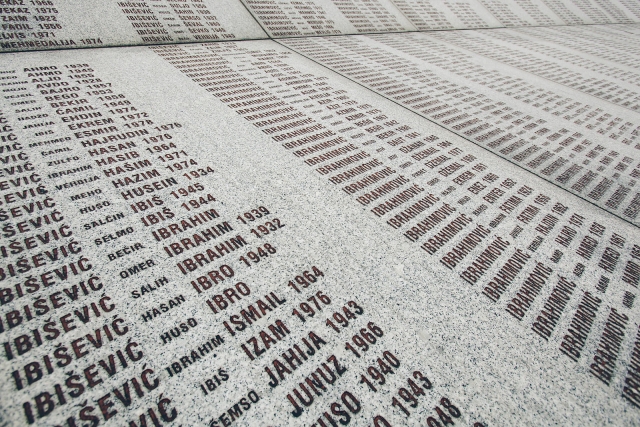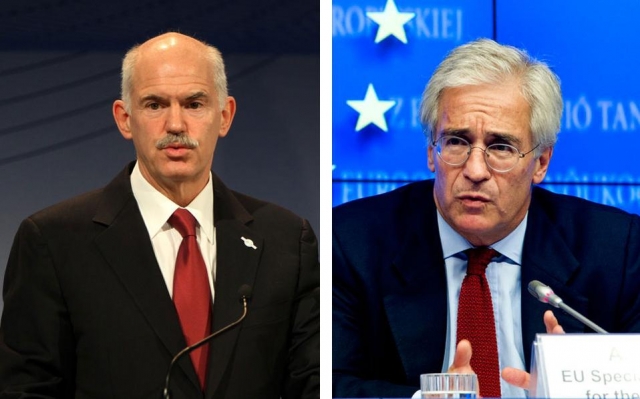The news that the non-governmental organization "International De-mining Centre" had been able to drain 9,000,000 euro from the budget of the Greek Ministry of Foreign Affairs is still the top headline in the Greek media. However, only one media reveals the far more scandalous news that some of this money had been sent to former Bosnian Serb leader Radovan Karadzic in the years when he was wanted for the war crimes committed under his leadership.
According to an article by journalist Takis Michas in Protagon.gr, Greek diplomats had used the organization as a channel to finance Karadzic, thus helping him hide from the members of the multinational peacekeeping force SFOR.
The first indictment against former President of Republika Srpska and Chief of Staff of the Bosnian Serb army Ratko Mladic was raised in July 1995 and the second in November the same year. The charges against Karadzic involved genocide against Bosnian Muslims, crimes against humanity, violations of war laws or customs and grave breaches of the Geneva Convention.

The names of the victims of the Srebrenica massacre committed in July 1995 under the leadership of Ratko Mladic
For 12 years, Karadzic had been hiding from the International Criminal Tribunal for the former Yugoslavia. On 21 July 2008, the Serbian special police apprehended him in Belgrade, where he had lived for years.
The fact that the authorities had been unable to apprehend him for such a long period of time had made him a national hero for Bosnian Serbs. According to the article in Protagon.gr, all this time, Karadzic had had the support of loyal friends and supporters who had been taking care of him by providing hiding places for him as well as information about the actions of the investigating authorities and especially cash.
The core of this network was Dusan Tesic, a bodyguard and very close friend of Karadzic, who was captured by SFOR in Pale in 2005. According to the statements by SFOR leaders before local media in Bosnia, Tesic had started giving all sorts of information after his arrest. But what surprised the members of SFOR the most was the information that, since 2001, he had been a member of a Greek NGO involved in the de-mining of the region, namely the "International De-mining Centre."
In other words, as stated by the author of the article, a Greek organization, which the Greek Foreign Ministry had financed for years, had funded a man who had played a key role in the hiding of Radovan Karadzic.

Radovan Karadzic at the International Criminal Tribunal for the former Yugoslavia in The Hague
After the disclosure, SFOR had begun to closely monitor the activities of the Greek organization. In a conversation that had taken place at the beginning of the past decade between Takis Michas and Tribunal spokeswoman at the time Florence Hartmann, the latter had confirmed the information and expressed her great surprise at the fact that Greek government money had been used to finance the fugitive Karadzic in order for international peacekeeping forces not to capture him.
In his statements to Bosnian media, a local former employee of the organization indicated that Tesic had had a very close relationship with its head Konstantinos Tzevelekos. "When Tesic was speaking with Konstantinos he used another interpreter, who came from Athens for this purpose. No one else could attend these meetings."
However, he was only one side of the relationship between the NGO and the circle around Radovan Karadzic. The "International De-mining Centre" had been closely connected with UNIPAK company based in Pale too, which supplied the organization with a variety of things, including employees.
Director of the company was Radomir Kojic, former chief of police appointed by Karadzic. In 2003, the European Union had banned him from travelling in the member states due to his involvement in the concealment of the former president.
When UNIPAK had undertaken to select the employees of the organization, it had thrown out all those who were not Serbs. "No one explained to us why we had been thrown out without being allowed to complete the work for which we had signed contracts," stated a former employee of Croatian origin.
In conclusion, Michas states that the Greek media have reflected none of the events previously mentioned. "As for me, whenever I tried to write something about the Greek NGO and its links with Karadzic in the newspaper for which I was working at that time, I always obtained in response a categorical and inexplicable NO".
Meanwhile, former Greek Prime Minister George Papandreou and his long-time collaborator Alex Rondos categorically deny any connection with the organization, although the money had been drained in the period from 2000 to 2004 when Papandreou headed the department.
In a message to the media, the office of the former Prime Minister condemns "the attempts by some media to involve George Papandreou in the case in a way that has nothing to do with truth and reality."

George Papandreou and Alex Rondos, Photos: Kathimerini
In turn, Alex Rondos, who is a defendant in the case, has expressed surprise about it. He was born in Tanzania and spent most of his professional life in Africa, where he had acquired extensive experience as an employee in the U.S. and British NGOs.